- Home
- John Bellairs
Revenge of the Wizard's Ghost Page 4
Revenge of the Wizard's Ghost Read online
Page 4
Professor Childermass groaned. "Charley, I honestly don't know what's reasonable at this hour of the night. I have a headache, and I'm dead tired. But if there's a chance—any chance at all—of finding something that will save Johnny, I'd turn the whole Hudson Valley upside down! Tell me, what do you think my chances are of getting inside this estate to poke around and play burglar?"
"I'd say your chances are pretty good," his friend replied. "The Windrow Estate stood empty for years after Zebulon died, and the whole place started falling into ruins. Not so long ago a private foundation bought the place, and they're fixing it up so it can be opened as a tourist attraction this Memorial Day. During the daytime there'll probably be an army of workmen at the estate, but if you sneak in in the evening, you'll probably have the place to yourself. I'd help you, but I scare easily, and I have bad legs. I'd just be in your way."
"I'm sure you would be," said Professor Childermass with a chuckle. "But look, Charley—my head is throbbing and I'm asleep on my feet. Tomorrow I'll start making plans to go to the estate. But before I hang up, I have one little question to ask: You say that you scare easily. What do you think there'll be at the Windrow estate to be scared of?"
"Who knows, Roderick? Who on earth knows?" And with that, Professor Coote hung up.
CHAPTER SIX
The next morning, when he woke up, Professor Childermass could hardly believe that he had had that strange telephone conversation with his old friend. Now that his head was clear, he wondered if he really ought to go off on this wild goose chase. Could the Urim and the Thum-mim really be at that old estate? It seemed very unlikely, but on the other hand, the thing that had happened to Johnny was pretty unlikely. And how else could he be saved? The doctors at the hospital couldn't drive the spirit of Warren Windrow out of Johnny's body. A long shot was better than no shot at all. So the professor made his mind up: He would go. For days he planned. He ransacked his basement for tools, and he dug an old leather satchel out of his attic. He drove up to Durham and got a guidebook and a map from Professor Coote—these had been issued by the foundation that was fixing up the Windrow estate. The next evening the professor called up Fergie and asked him to come over to his house. No, he wouldn't say over the phone what he wanted him for, but he claimed that it was very important. It was about a plan he had, to save Johnny's life.
When Fergie arrived at the professor's house, the old man marched him into the living room, gave him a piece of chocolate cake and a fork, and started telling him his plan. He explained about the Urim and the Thummim, Ensign French, the tomb with the weird inscription, and old Zebulon. Fergie sat listening in openmouthed amazement. He even forgot to eat his cake.
". . . and so that's what I think we ought to do," said the professor, finishing up. "I want you to come along and help me. I need someone who's gutsy and resourceful. I need someone who won't cave in when the going gets rough—and that's you, my friend. You know what's happened to Johnny, and you also know that there's very little chance of saving him unless we fight magic with magic. Will you go with me to find the Urim and the Thummim?"
Fergie put his uneaten cake down on the coffee table and pondered. There was a doubtful frown on his face. He had seen Johnny's twisted face; he had seen and heard a lot of strange things in the last few months. But he was a skeptical kid, and he didn't really want to believe that an evil spirit had taken possession of Johnny's body. There might be some other explanation, a scientific one.
"I . . . I dunno, professor," said Fergie slowly. "All this stuff about amulets and devils sounds kinda nutty to me. Maybe Johnny really does have a brain sickness, like the doctors say."
The professor was beginning to get exasperated. "Oh, brain sickness, your grandmother!" he growled. "You told me that he saw a box of matches in the ice cream parlor and called them loco focos. Well, I looked up that weird little phrase and it's what they called matches back in the 1830s. How the dickens would Johnny have known about that, unless he was possessed by the spirit of somebody who was alive in the 1830s?"
"He might've looked it up, same's you did," said Fergie calmly.
The professor ground his teeth and glared at Fergie. Then, without a word, he walked over to the sideboard and jerked a drawer open. After fumbling a bit, he pulled out a paper-wrapped parcel and a magnifying glass. With a snort he dashed back to the coffee table and laid these things down in front of Fergie. As Fergie stared with a puzzled expression, he unwrapped the parcel and laid the magnifying glass down next to it.
"All right!" said the professor fiercely. "You want to be logical, let's be logical! There are the glass photograph and the gold coin—you've seen them before, I know, but I have a few things to tell you that may surprise you. Pick up the magnifying glass and have a look at the buttons on the coat that the man in the photograph is wearing. Have a good look."
Fergie took the magnifying glass in his hand and peered. His eyes opened wide, and he leaned a little closer and peered some more. "The buttons say W.W.," he said quietly. "So it must be a picture of—"
"Warren Windrow," snapped the professor, cutting him off. "Of course, it could be a photo of a young man named Woodrow Wallace or Walter Wintergreen, but I don't think that's terribly likely. All right, let's talk about the gold coin. I looked it up, and it was minted by somebody named J. S. Ormsby, in Sacramento, California, in the year 1849. And that coin is so rare, there is only one of them around! How the blue blazes did Johnny get his hands on one? And why was he keeping it in his bureau drawer, along with a photo that is a hundred years old? Can you come up with any logical explanations?"
Fergie shook his head.
"All right then!" the professor said, stabbing his finger at Fergie. "Will you come and help me before it's too late?"
Fergie turned pale, and he nodded. In a low voice, he said that he would do what he could to save Johnny.
The next day Professor Childermass called up Fergie's mother and he did some fast talking. He told her that he wanted to take Fergie on a short trip to the Hudson River Valley to see Washington Irving's home and other places of interest. To make the trip sound reasonable, he said that it would help Fergie in his schoolwork, and he added that Fergie needed to get away from Duston Heights for a while, so that he would stop thinking about Johnny and his tragic illness. Fergie would have to be ready to go early Friday morning, so of course he'd have to be excused from school for that day. Was this possible? At first Mrs. Ferguson resisted, but the professor could be very charming and persuasive when he wanted to be, and at last she gave in. She would get her son excused, and she hoped that he would have a wonderful time.
On the very next Friday morning, at a quarter past ten, Fergie was sitting at the kitchen table in his home, waiting for the phone to ring. He was wearing his motorcycle outfit: skintight blue jeans, black ankle-high boots, and a black-leather jacket covered with chrome-plated studs and red-glass reflectors. Near him, on the worn linoleum, stood his suitcase. It was old and beat-up, and had dirty red-plaid sides and a zipper. Into it he had stuffed everything he thought he would need, including a large red portable searchlight and a small crowbar that he had swiped from his dad's tool chest in the basement. His dad wouldn't miss the crowbar right away—he was off on one of his weekend selling trips. Mr. Ferguson sold encyclopedias, Bibles, and mail-order shoes, and he didn't make a lot of money. But he worked like a beaver driving around the countryside in his old blue Ford, trying to drum up more business. Fergie worried about his dad; he was afraid that he was working too hard. Fergie thought about the Urim and the Thummim, the magical doojiggers that he and the professor were going after. After they saved Johnny from the evil spirit, perhaps they could sell the amulets to a museum for a lot of money. He hoped so. . . .
Fergie winced. He felt guilty to be thinking about money at a time like this, with Johnny lying sick in bed. But when he looked around at the shabby furnishings of the living room, he thought about how nice it would be to come waltzing in the door and throw a big bund
le of hundred-dollar bills on the table. It wouldn't be just nice, it would be like heaven!
"Fergie? Wasn't the professor going to call you a half hour ago? What do you suppose he's doing?" This was Mrs. Ferguson, calling through the open kitchen doorway. She was a worn-looking, mild little woman with stringy gray hair. She had been doing the dishes and had been having some second thoughts about this trip that her son was taking. She knew the professor, and she trusted him in spite of his being nervous, irritable, and a bit on the eccentric side. Still, she wouldn't have been terribly surprised to have him phone and call the trip off. She would even have been a bit relieved if that had happened.
"I dunno why he hasn't called, Mom," said Fergie, answering his mother's question. "He told me to be ready at a quarter to ten, an' he said he'd give me a buzz before he came over. He's usually so darned persnickety about stuff like that. . . ."
The phone rang.
In an instant Fergie was on his feet. He ran to the sideboard and ripped the receiver from the cradle. It was the professor. In his usual raspy voice he apologized for being late and said that he'd be over in ten minutes. Fergie hung up and heaved a big sigh of relief. He had been kind of uncertain about this trip at first, but now he was all worked up and ready to go.
Exactly ten minutes later Professor Childermass pulled up in front of the Fergusons' house in his mud-spattered maroon Pontiac. Fergie was waiting on the porch with his suitcase in his hand. His mother was right beside him, and now she gave him a big smooch on the cheek. Fergie winced—it always embarrassed him when his mother kissed him in public.
"Have a good time!" she called as he took off, running down the walk. "Did you remember to pack your baby Brownie camera?"
"Yeah, Mom, I did!" Fergie called back. This was a lie. He hated to fool with cameras, but his mother thought they were an essential part of any sightseeing trip. Oh, well—he could apologize to her when he got back.
Slam. Into the trunk went Fergie's suitcase. Fergie climbed into the front seat, the professor revved up the engine, and they went peeling off in a cloud of exhaust smoke. The trip was on. They drove for hours across Massachusetts and through a corner of Connecticut. The professor drove fast—though not as fast as he usually did. Around two-thirty in the afternoon they reached the Bear Mountain bridge on the Hudson River. Beyond it, in both directions, high hills and riverside cliffs stretched away into blue distances. As they drove across the bridge, the professor told Fergie stories about the Dutch settlers who had lived there long ago. He also pointed out that they were leaving Washington Irving's estate behind. Fergie knew they weren't really on a sightseeing trip. They were here to dig in the grave of the long-dead, mysterious Ensign French to find the two ancient talismans that would bring Johnny out of his coma.
"Hey, prof!" said Fergie, as they swerved north on a road that led away from the bridge. "Are we very far from the estate?"
The professor lit a black-and-gold cigarette and blew out a long, thin stream of smoke. "No," he said with a confident smile, "we're not far from the place at all. If we follow this road for a while, we wind up in a little bitty town called Van Twiller, and the entrance to the Windrow estate is only a mile or so outside the town. We are not going straight to the estate. At this time of day the place will be swarming with workmen, so we will just have to wait. Tomorrow night will be the time to make our move, I think. In the meantime, we are going to get ourselves a place to stay in lovely little Van Twiller, and then we are going to pretend to be tourists and prive out past the place to case the joint before we knock it over." The professor chuckled wickedly. "Case the joint. Knock it over" he said quietly, savoring the phrases he had used. "My, my! I'm beginning to sound like a gangster in a movie! As a matter of fact, I'm beginning to feel like one too. . . . Heavens! What would my dear sainted mother have said?" With a quick flick of his wrist, he threw the stub of his cigarette out the vent window, and he began to whistle jauntily through his teeth. There was a rakish, devil-may-care air about him as he drove on, and Fergie began to glance at him skeptically. He was wondering what kind of trouble this crazy old man was going to land the two of them in.
The road wound among steep, rugged hills. Once, from the top of a rise, they saw a tall stone steeple glowing in the afternoon light, and they began to get excited because they knew that the estate must be nearby. Then the road sank into a deep valley, and the steeple vanished. It was close to three-thirty when they drove into Van Twiller. The downtown part of the town was just a collection of old red-brick buildings grouped around a grassy town square. In the center of the square, on a low pedestal, stood a statue of a fireman and a brown sandstone drinking fountain. Pigeons were strutting in the grass, and people were reading newspapers on benches. As the maroon Pontiac rolled into the square, a hoarse bell in a church steeple clanged once.
"Ah, small-town America!" sighed the professor. "I keep thinking I might want to retire to some place like this, even though I know that I would go buggy if I had to stay here more than a couple of days. Does the guidebook say how many people live here?"
Fergie flipped the pages of the small blue book he was holding. "Hmm. . . lemme see . . . it says pop. 500. Pretty small Where're we gonna stay?"
"Wait'll you see," said the professor, chuckling. "You'll probably hate it."
The car pulled into a parking space in front of a four-story brick building with a fancy greenish copper cornice. Over the door was a wooden sign that said VAN TWILLER HOTEL.
"Is this it?" groaned Fergie. "I thought we were gonna stay in a motel!"
"Well, you thought wrong," snapped the professor. "Motels are for people who are fleeing from the police—they are not for respectable folk like you and me. Now quit grousing and help me bring the bags inside. After we check in, we can go down the street and eat. I saw Somebody-or-Other's Steak House on the way in, and those places usually have pretty good burgers. Come on!"
A few minutes later Fergie was following the professor into the cool, musty-smelling lobby of the old hotel. In one corner was a high, marble-topped desk with pigeonholes behind it for mail and a rack full of room keys. A grumpy-looking old man in a navy-blue suit smiled at the professor and then glowered at Fergie.
"Will you be wanting a room, sir?" he asked in a voice that was full of weariness.
"I have one reserved, I hope," said the professor crisply, as he set his suitcase down. "My name is—"
"Wait . . . there it is, I've got it," said the man, pressing the page with a knobbly finger. "Professor Simcox, reserved for two nights. Very good. We can put you in—"
"That's Childermass" said the professor, pronouncing the name with extreme care. "C-h-i-l-d-e—"
"Right you are," said the man, giving him a bored look over the top of his glasses. "You'll be in Room two-thirteen, Mr. Chimcark." And as the professor glared furiously, the man turned away, fetched down the key from the board, and laid it on the desk. Fergie had a hard time keeping a straight face, but somehow he managed. Biting his lip, he picked up his suitcase and followed the professor across the lobby toward the flight of red-carpeted stairs.
Their hotel room turned out to be quite nice. A wine-colored carpet covered the floor, and there was an oval marble-topped table by the windows. Side by side on the rug stood twin brass bedsteads topped with shiny knobs, and a hurricane lamp with a delicate rose-red globe cast its warm, friendly light over the scarred black night table. The professor was delighted with the old-time quality of the furnishings, but they made Fergie a bit nervous. He remembered the way the desk clerk had glared at him, and he felt sure that if he broke anything, his family would wind up having to pay for it.
After they had gotten washed up, the two travelers went across the square to Steve's Steak House and stuffed themselves on cheeseburgers and french fries. Fergie had a Coke, and the professor drank coffee, and both finished up with homemade blueberry pie à la mode. When they were done, the two travelers felt full and at peace with the world. However, they had not forgott
en what they had come all this way for. When they sauntered out into the square again, they were glad to see that it was still light outside. Fergie squinted up at the sun, which hovered over a mass of trees in the distance.
"Hey, professor," he said hesitantly, "d'ya think we oughta go out an' have a look at that . . . whatchamacallit estate now?"
The professor took out his watch and squinted at it. It was a little after five. "Yes, I suppose that is what we ought to do," he said as he snapped the gold-plated lid shut and jammed the watch back into his vest pocket. "By the way," he added, "you don't sound like your usual overeager self. Are you afraid we'll get tossed in the clink for trespassing?"
Fergie gave the professor a dirty look. "If you're not scared, I'm not scared either," he muttered sullenly. "Come on—let's go!"
The professor grinned. "Stout fellow!" he said, patting Fergie on the shoulder. "For the time being, however, you can relax—we're not going to pull anything fancy this evening. I just want to see what the place looks like."
Fergie and the professor walked quickly across the square, got into the car, and drove off. Once they were outside the town, they followed a narrow two-lane blacktop out to the Windrow estate. Long before they got there, they could see the tall stone steeple rising over the trees. One side of it glowed reddish-orange in the light of the late afternoon sun, and birds were wheeling around the bases of the pinnacles. The professor and Fergie were driving along next to the red sandstone wall that surrounded the grounds of the estate. The enormous church loomed very near, shadowy and somehow threatening, like a crouching monster of stone. Next to the church was the mansion, a grim square block with a large, egg-shaped copper dome rising up out of the middle. Atop the dome was a funny little doodad shaped like a saltshaker, and from it sprouted a short pole with a metal flag on it. The letter W had been cut out of the metal and could be seen glowing sky blue against the dark background.

 The Curse of the Blue Figurine
The Curse of the Blue Figurine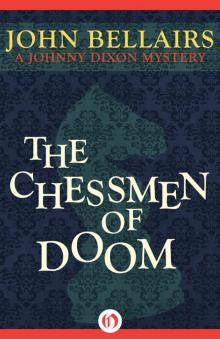 Chessmen of Doom
Chessmen of Doom Secret of the Underground Room
Secret of the Underground Room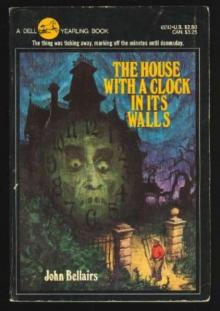 The House With a Clock in Its Walls
The House With a Clock in Its Walls The Vengeance of the Witch-Finder
The Vengeance of the Witch-Finder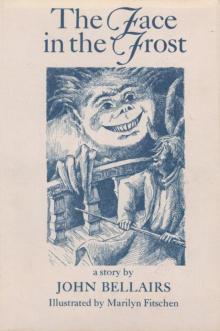 The Face in the Frost
The Face in the Frost Revenge of the Wizard's Ghost
Revenge of the Wizard's Ghost Spell of the Sorcerer's Skull
Spell of the Sorcerer's Skull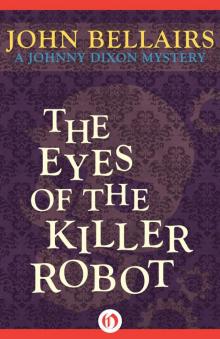 Eyes of the Killer Robot
Eyes of the Killer Robot Mummy, the Will, and the Crypt
Mummy, the Will, and the Crypt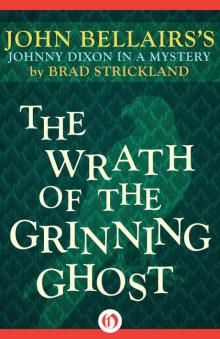 Wrath of the Grinning Ghost
Wrath of the Grinning Ghost The Mansion in the Mist
The Mansion in the Mist The Doom of the Haunted Opera
The Doom of the Haunted Opera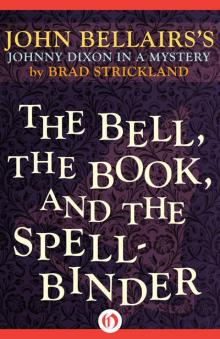 The Bell, the Book, and the Spellbinder
The Bell, the Book, and the Spellbinder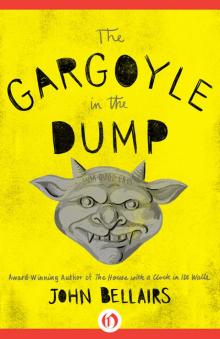 The Gargoyle in the Dump
The Gargoyle in the Dump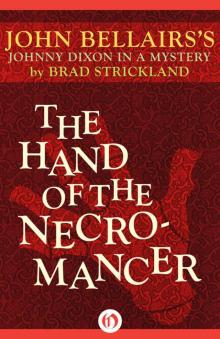 The Hand of the Necromancer
The Hand of the Necromancer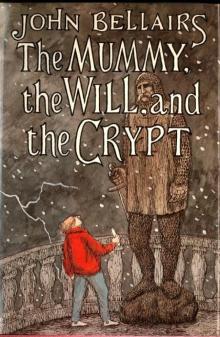 The Mummy, the Will, and the Crypt
The Mummy, the Will, and the Crypt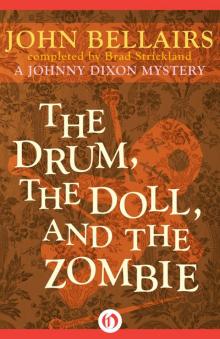 Drum, the Doll, and the Zombie
Drum, the Doll, and the Zombie The Specter from the Magician's Museum
The Specter from the Magician's Museum The Letter, the Witch, and the Ring
The Letter, the Witch, and the Ring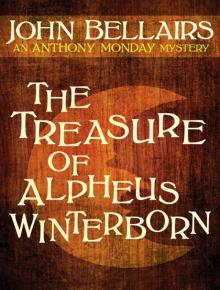 The Treasure of Alpheus Winterborn
The Treasure of Alpheus Winterborn The Dark Secret of Weatherend
The Dark Secret of Weatherend The Figure in the Shadows
The Figure in the Shadows